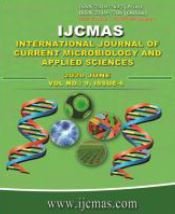


 National Academy of Agricultural Sciences (NAAS)
National Academy of Agricultural Sciences (NAAS)

|
PRINT ISSN : 2319-7692
Online ISSN : 2319-7706 Issues : 12 per year Publisher : Excellent Publishers Email : editorijcmas@gmail.com / submit@ijcmas.com Editor-in-chief: Dr.M.Prakash Index Copernicus ICV 2018: 95.39 NAAS RATING 2020: 5.38 |
Genotype-environment interaction and stability analysis has been important for plant breeders and plays a vital role in identifying genotypes that are stable or unstable in each environment. Varieties that show low G x E interaction and high yield are desirable for crop breeders. The study was conducted in 2018 at six locations in India to (i) determine the presence of G x E of 171 single cross maize genotypes and (ii) To use the GGE biplot methodology to determine grain yield performance and stability of the genotypes evaluated across six environments. The effects of genotype and environment were significant (P < 0.01) for grain yield. Pooled ANOVA analysis of 171 genotypes in six environments (E1-E6) showed highly significant differences for environments, significance of variance due to G x E in pooled analysis also indicated the presence of significant genotype x environment interaction. Genotypes G4, G74, G72, G6, G5 and G107 were high yielders with high interaction with environment. Genotypes G73, G159, G97 have highest positive IPCV values and G91, G32, G75 and G132 have highest negative IPCV values indicating that these are highly unstable genotypes. The two-line system has been widely applied for rice breeding since it has many advantages such as, two-line system has more extensive germplasm resources that is beneï¬cial to the development of heterosis, better hybrid seed production yields, absence of negative effects associated with sterility-inducing cytoplasm especially on grain quality.
 |
 |
 |
 |
 |